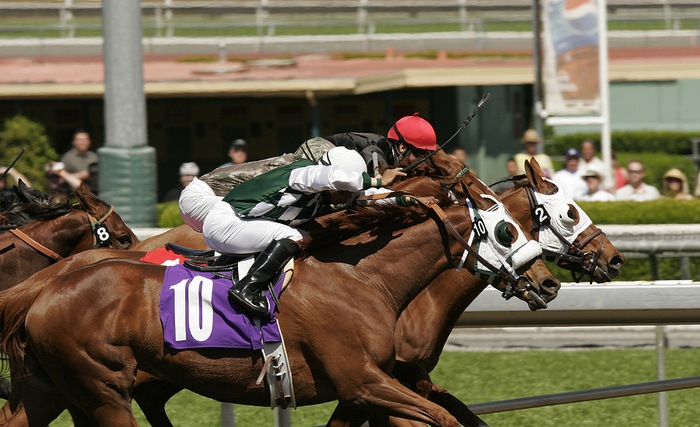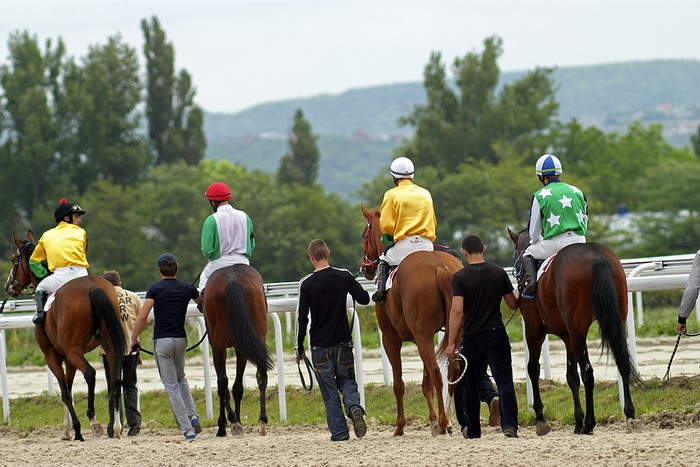
The Rules of Racing are set by the British Horse Racing Authority (BHA).
They apply to jockeys and trainers, stable employees, stewards, judges and racehorse owners.
They cover racing, training, riding, owning, administration and anti-doping.
The main rules to get to know are below.
Main Horse Racing Rules
Abandoned or Postponed Races
If a race or whole meeting is abandoned, any bets placed will be declared void and monies returned.
Amendments After The Official Result
A result is official after the announcement that the jockeys have ‘weighed-in’. Appeals even after this stage can be made by trainers and owners and they may have the official result overturned. Mostly, the outcome of this will be ignored by bookmakers.
Ante Post
Ante Post bets will be accepted by bookmakers at quoted prices up to and including the time of the official final declarations. Unless the race in question is abandoned or declared void, the venue is altered or the horse is balloted out then no refunds will be given on an Ante Post bet where the horse fails to run.
Coupling
Though not a practice in Britain, the act of coupling is used in France on their Pari Mutuel system and still affects backers in Britain when betting on horses in races such as the Prix de l’Arc de Triomphe.
This happens when two or more runners are in the same ownership; both horses will have the same quoted price so whichever one wins they will have the same returned starting price.
Dead-Heats

A dead-heat is a tie between two or more runners in a race, though these are rare. The technology is such now that even if there are just a couple of centimetres separating the horses’ noses at the finish then this can be discovered by the judge reviewing the official photograph.
When this can’t happen, the result is a dead-heat and those backing either of the two horses involved will receive half of their winnings. So, a horse dead-heating at 6/1 will be paid out as a 3/1 winner.
Favourites
The favourite is determined to be the runner quoted in the official starting price returns at the shortest odds. If two horses are quoted at the same odds and shorter than any others, they are considered ‘joint-favourites’. Three or more at the same price would be considered ‘co-favourites’.
First Past The Post (FPP)
Usually these days, bets are settled on a FPP and official result basis, a practice called double result. So, should a horse win then those who have backed it will be paid out. Often though, there will be a Steward’s Enquiry where the race day officials may see interference, i.e. one horse has run across another and stopped it from winning. Having interviewed the jockeys concerned, the stewards may, if they see fit, reverse the placings of the horses involved. When this happens, the official result is changed and those backing the horse now named as the winner may be paid out.
Non-Runners

Horses taken out of a race by their trainer or owner after the official declaration stage (24 hours before over jumps and 48 hours before on the flat) are then considered a non-runner, i.e. those not coming ‘under starter’s orders’. Those having backed said horses will get their stakes back. Should the horse make it to the official start of the race but refuse to run, the horse will be classed as a runner and no money shall be awarded to its backers.
Should the horse make it to post but then not run for any reason, then this shall be considered withdrawn rather than a non-runner, as the bookmakers will not have time to form an entirely new market and any winning bets will be subject to a Rule 4 deduction (see below).
Reserves
Occasionally in Britain and often in Ireland, reserve horses are named. This means that, should there be any non-runners; reserves may step in to ensure the race remains competitive.
Rule 4
Much to the chagrin of punters, Tattersalls Rule 4 is enforced very regularly. This regards withdrawn horses (not non-runners) and pertains to the price at the time of the withdrawal of the horse deducted in £ or equivalent from winnings. For example, if a horse was 2/1 at the time of withdrawal then there would be a 50p in the £1 deduction from all winning bets.
A full table is available from Tattersalls as part of the Rules of Racing on what percentage of winnings will be deducted from bets depending on what price the withdrawn horse was.
Stewards Enquiry
This is an official enquiry held at the racecourse on race day after any given race. Advised by the Stipendiary Steward, a panel are presented a case such as when two horses cross or come into contact with each other. The panel will decide whether the result of the race has been affected and will ask questions of the jockeys involved as well as reviewing several camera angles in order to ascertain this.
Following the enquiry, the panel may change the result or leave the placings unaltered and also hand out riding bans or fines to any jockeys they feel have broken the Rules of Racing.